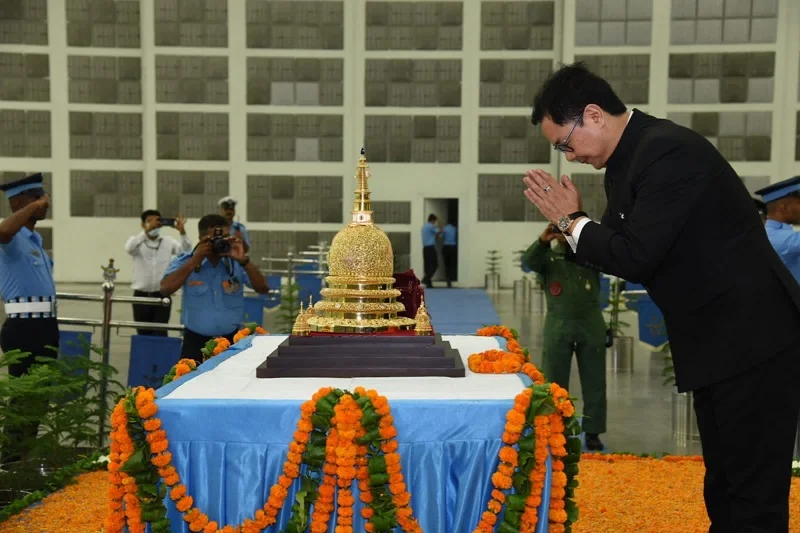A 25-member delegation led by Law minister Kiren Rijiju left for Ulan Bator today with the ceremonial casket of Buddhist holy relics for an 11-day exposition being held as part of celebrations of Mongolian Buddh Purnima falling on June 14.
The four holy relics of Lord Buddha are being taken from India to the north-central Asian nation as a special gesture towards people of Mongolia. The holy Buddha relics, currently housed in New Delhi's National Museum, are known as the ‘Kapilvastu Relics’ since they are from a site in Bihar first discovered in 1898 which is believed to be the ancient city of Kapilvastu.
Flown to the Mongolian capital in a special Indian Air Force C-17 Globe Master, the relics will be accorded the status of a State Guest and have been taken in the same climate control case as it has been kept presently at the National Museum. Two bullet-proof casings as well as two ceremonial caskets are being carried by the Indian delegation for both the relics.
"Left for Mongolia with the ceremonial casket of Buddhist holy relics for an 11-day exposition on occasion of Mongolia's Buddha Purnima on 14th June 2022. After Hon'ble PM @NarendraModi ji visited Mongolia in 2015, the bond between both countries has become very strong," tweeted Rijiju Monday morning.
They will be received in Mongolia by the Culture Minister of Mongolia; Advisor to the President of Mongolia and a large number of monks among other dignitaries. The relics will be displayed at the Batsagaan Temple within the premises of Gandan Monastery along with the relics from India.
The last time these relics were taken out of the country was in 2012 when their exposition was held in Sri Lanka and were on display at several locations across the island nation. However, later guidelines were issued and the holy relics were placed under the 'AA' category of those Antiquities and Art Treasures which should not be ordinarily taken out of the country for exhibition, considering their delicate nature.
Before leaving, Rijiju had said that it is another historic milestone in India-Mongolia relations and will further boost cultural and spiritual relations between the two countries.
Recalling the visit of PM Modi to Mongolia in 2015, Rijiju said that Narendra Modi was the first-ever Prime Minister of India to visit Mongolia, and taking the relics to Mongolia is an extension of the vision of Prime Minister to revive relations with the countries with whom India has had cultural and spiritual ties since centuries ago.
Left for #Mongolia with the ceremonial casket of Buddhist holy relics for an 11-day exposition on occasion of Mongolia’s Buddha Purnima on 14th June 2022. After Hon’ble PM @narendramodi ji visited Mongolia in 2015, the bond between both countries has become very strong. pic.twitter.com/TsVQCOSr0C
— Kiren Rijiju (@KirenRijiju) June 13, 2022
He explained that Mongolia and India look upon each other as spiritual and cultural neighbours and due to this commonality, Mongolia can also be said to be our ‘Third Neighbour’ even though we don’t enjoy any common physical boundaries.
Emphasising that India believes in peace and harmony and wants to spread this message throughout the world through the teachings of Lord Buddha, he had added that teachings of Lord Buddha are relevant even in today’s time and will guide humanity towards greater peace, harmony and prosperity.
The Indian government continues to make all efforts to spread Lord Buddha’s message of peace and compassion all over the world. Accordingly, Government is working on several projects to develop Buddhist sites, locations and the Buddhist centres in India. Inauguration of Kushinagar airport recently is one such example.
In a first ever visit by an Indian Prime Minister to Mongolia in 2015, PM Narendra Modi visited Gandan Monastery and also presented a Bodhi Tree Sapling to Hamba Lama. Pointing out the centuries old Buddhist ties between the two countries, the PM had defined India and Mongolia as "spiritual neighbours" during his address to the Mongolian Parliament.
Also Read: Holy Relics of Lord Buddha being taken from India to Mongolia for 11-day Buddh Purnima celebrations




















